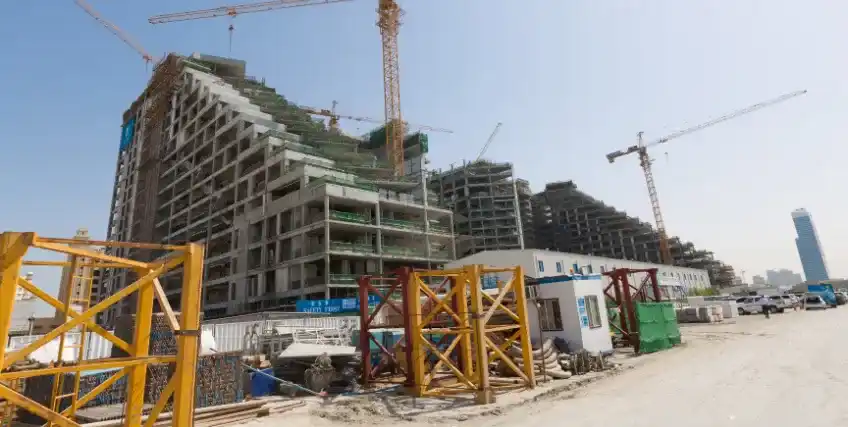Hotel Construction Loans Interest Rates, Terms, and What to Expect
September 8, 2025 | Last Updated on: September 8, 2025

Hotel construction loans have become the backbone of modern hospitality development, playing a pivotal role in transforming an ambitious blueprint into a thriving destination. As the hotel industry continues to expand to meet the needs of travelers in diverse markets, the demand for innovative, well-situated hotels is higher than ever.
Bringing such large-scale construction projects to fruition requires significant financial backing, which is rarely available through conventional means. This is where hotel construction loans step in, specialized financial products tailored to the unique demands and inherent risks of hotel construction and renovation.
Unlike standard commercial loans, hotel construction loans are structured to match the complex, phased nature of hotel projects, ensuring that funds are carefully disbursed as critical milestones are achieved.
For developers, investors, and operators, understanding the nuances of these loans is not only crucial to project success but also essential for securing the capital that fuels growth. In this article, you will learn how to compete in the rapidly evolving hospitality landscape.
Understanding Hotel Construction Loans
Every successful hospitality business relies on the assistance of hotel construction finance. Rather than a straightforward payment, these financing structures are tailored specifically to the industry's needs, enabling phased funding in sync with construction milestones that have been achieved.
Not only is the staged process convenient, but hotel developers and hotel owners also appreciate it as seminal, as it helps navigate high costs, mitigates risk, and facilitates capital deployment in sync with project developments and unexpected project issues.
Unlike typical lump-sum business loans, hotel construction loans are not a single transaction. Rather, funding is made available in tranches or 'draws,' each linked to specific project checks, such as purchase of land, site work, and repeated rounds of construction.
This dynamic structure enables efficient cash flow management and provides lenders with an additional level of security, thereby reducing their exposure to delays or overruns.
The Process: From Application to Disbursement
Opening the hotel construction funding process begins with the meticulous preparation of a sophisticated proposal. This includes blueprints, a cost breakdown, a construction calendar, and a sufficient budget. The lenders examine these documents to assess the project's viability and the borrower's creditworthiness.
After a lender expresses a willingness to proceed,hotel construction loans approval is often contingent upon these specific submissions. Even after approval, borrowers only pay interest on funds that have been disbursed, allowing for cost-effective financing during the peak-burn construction period.
Upon completion, there is typically a transition to longer-term hotel funding, such as a conventional commercial mortgage, marking the key juncture from borrower risk and into asset monetization.
Interest Rates: Where Do They Stand in 2025?
Knowing the prevailing interest rates is crucial for making informed financial decisions regarding hotel construction financing.
Interest rates for hotel construction financing varied considerably in August 2025These rates reflect the sophisticated risk profiles of large, multi-phased development projects in the hospitality sector.
Rate determination is based on various factors, including borrower credit, the loan-to-value ratio, total project risk, loan size, and market trends. Importantly, interest is paid only on utilized loan amounts and not on the total loan balance.
This can alleviate the financial strain during the lengthy construction phase when the property isn't yet generating income.
Typical Terms and Structure
Hotel construction loan tenors are typically short- to mid-term, with initial phases of 1–3 years (aligning with the main construction phase), followed by conversion that enables the asset to stabilize and start generating income.
Typical total loan tenures are 5–7 years, with the option to convert into permanent finance for hotels that demonstrate strong financial performance after completion of the hotel construction loans.
Repayment terms typically begin with payments of interest alone during the construction phase. This then turns into amortizing principal and interest payments once the asset begins operation, releasing early-stage cash for other project needs and alleviating the initial stress on the developer's balance sheet.
Eligibility Criteria: What Do Lenders Look For?
Obtaining a hotel construction loan is a challenging task that requires submitting a strong case to lenders. The most important eligibility factors are a credit score of 680 or higher, robust business and personal financial statements, and an established record of experience in the hospitality sector.
Lenders require a comprehensive business plan, accompanied by an in-depth market analysis, conservative revenue projections, and well-defined operational plans following the construction phase.
One major consideration is the loan-to-value (LTV) ratio, which generally has a cap in the range of 60–75% for hotel building projects. Lenders also require a feasibility study to assess project viability and may insist on heavy collateral or assets pledging to secure the loan.
Fee Structures and Other Costs
Applicants for hotel construction loans can expect to pay several fees in addition to interest. Some of these may be origination fees, closing fees, commitment fees to reserve funds, construction draw inspection fees, and prepayment charges.
Forward-thinking borrowers inquire about such fees ahead of time so there are no surprises in the closing or drawing process.
Conversion to Permanent Financing
A distinguishing feature of hotel construction loans is their conversion to permanent financing upon project completion.
On completion of the wrapping up of construction and the property going online, the outstanding loan can be converted into a permanent mortgage or refinance at a lower interest, a permanent loan secured by the stabilized hotel property.
The conversion is essential as it marks the transition from high-risk construction lending to relative stability in operating hospitality real estate.
Types of Hotel Construction Loans and Financing Alternatives
Not all hotel construction loans are equal. Aside from traditional construction loans, borrowers may qualify for products like:
- SBA 7(a) and 504 loans: U.S. government-backed SBA loans with favorable rates for qualified borrowers, ideal for small to medium-sized new hotels or large renovations.
- Bridge loans: Gap funding, typically at higher interest rates, to bridge the gap in cash flow until permanent funding is secured.
- Mezzanine loans: Hybrid securities or subordinated debt for more leverage deals.
Alternative sources, such as equity investment, crowdfunding, or seller financing, sometimes fill in behind conventional hotel construction lenders, adding flexibility to the capital stack but often with extra due diligence and negotiation.
What to Expect from the Lending Process
One must enter the field of financing hotel construction with realistic expectations for timing, complexity, and lender due diligence. It is a demanding process and potentially a lengthy one, given the unique risks and capital requirements in the hospitality industry development process.
Lenders will closely monitor adherence to the budget, construction timelines, and draw requests. Borrowers must expect frequent documentation and disclosure, as well as open communication about project challenges, delays, or reallocation of the budget.
Underwriting is only the beginning. While the building is being constructed, lenders monitor each step before approving subsequent draws. Borrowers must be disciplined, smart, and communicative to prevent delays and disruptions in funding.
The Big Picture: Why Hotel Construction Loans Are Worth It
Hotel construction loans, though complex, are the backbone of new and refurbished hospitality companies. Beyond providing the necessary infusion of capital to create opportunities, hotel construction loans offer structured lending designed to minimize risk for all.
Hotel construction lenders are highly specialized, attuned to industry demand, and well-equipped with the financial resources and expertise to keep projects on track even when setbacks occur.
Hotel construction financing for a new hotel development is not only a requirement, but also an opportunity. The correct loan can make the difference between opening a successful, competitive new operation and running out of steam halfway through the construction process.
The well-prepared, industry-designed lender underwriter, who understands the nuances of the hospitality environment and maintains close contact with experienced lenders, positions themselves to succeed in the rapidly evolving hotel business environment.
Conclusion
Hotel construction loan financing is a process, one that requires vision, experience, and a strategic approach to both project management and financing options.
By developing an understanding of current interest rates, customary terms, and expectations of hotel lenders, savvy developers will be well-positioned to navigate construction challenges and capitalize on opportunities in the hotel market.
From new development hotel construction financing to groundbreaking remodels, partnering with solid hotel construction lenders will turn visionary designs into welcoming hotels that stand the test of time.
This hotel construction loan guide can help developers, investors, and hospitality professionals not only manage but also master the complexities of hotel construction financing in today's age.
FAQs About Hotel Construction Loans
What is the interest rate for hotel construction loans?
Interest rates for hospitality financing can vary widely. The rate depends on factors like the borrower's credit, loan-to-value ratio, project size and complexity, and market conditions. Entrepreneurs with stronger profiles may access better loan options.
What are the typical terms of a construction loan?
New construction loans typically last for months, although terms may vary by lender and project. During this time, you pay interest only, not principal. Working closely with your lender ensures your financing solutions align with the project timeline and budget.
How long are construction loan terms?
Most construction loans, including those for an existing hotel expansion or hotel financing for new construction, are short-term, lasting six months to two years. This allows time to build while requiring a clear budget and timeline, which lenders need before approving hospitality financing.
How do monthly payments work on a construction loan?
Payments are structured as a drawdown, with funds released in stages. Interest is charged only on funds drawn, so monthly payments adjust throughout the construction period. This helps manage working capital effectively during the project.
What is not covered in a construction loan?
A construction loan typically won't cover furnishings, although it may fund permanent fixtures and essential appliances, such as refrigerators or washers. For other needs, entrepreneurs may explore separate loan options or complementary financing solutions.
Frequent searches leading to this page
Related Articles
Business Continuity Management in the Hotel Industry: Why Access to Capital Determines Survival
December 24, 2025
Term Loans are made by Itria Ventures LLC or Cross River Bank, Member FDIC. This is not a deposit product. California residents: Itria Ventures LLC is licensed by the Department of Financial Protection and Innovation. Loans are made or arranged pursuant to California Financing Law License # 60DBO-35839




